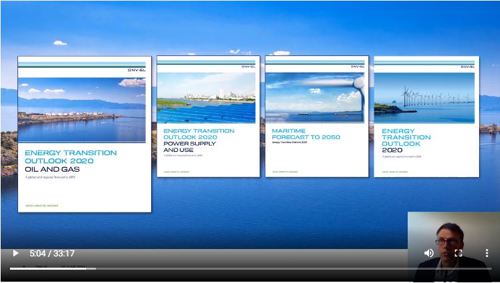2021 IRPC Process: Day 2 Keynote Address—What does the energy transition mean for the oils industry?
Cees de Regt, Senior Principal Consultant & Business Development Manager, Downstream, for DNV, presented one of Thursday morning’s Keynote Addresses during Day 2 of Hydrocarbon Processing’s IRPC Process virtual event.
“When we talk about energy transition, we mostly think about long-term developments in terms of energy demand and transition,” de Regt began. He stated that the long-term outlook of his presentation is based on DNV’s 2020 Energy Outlook, which shows that world energy demand will peak around 2035. “By 2050, more than half of the world’s energy is still expected to come from fossil fuels…mostly natural gas. Our report also shows the rapid activation of the world’s energy systems and the huge growth in renewables, as well as the importance of hydrogen as an energy factor.”

He also referred to the company’s 2021 Industry Outlook as a “short-term check-up” on the industry’s progress and movement toward the energy transition. He spoke about selected findings for different global and regional forecasts, including energy supply and demand, de-carbonization of the oil and gas industry, and multiple energy transitions.
He noted that energy demand is forecast to be 6%–8% less due to the global effects of the COVID-19 pandemic. “We see that the global growth in energy demand is existentially held back by large energy efficiency improvements in all sectors and by accelerated electrification,” de Regt said. “Combined with slower growth in productivity and global population, this is leading to the flattening and slight decline in the demand curve (through 2035).”
He stated that the world will need less energy, even as the global population increases and economies strengthen. “Large energy efficiency improvements in all sectors and accelerated electrification—with electricity dominated by renewables—will result in primary energy supply peaking in 2032. In the context of decarbonization, we’ve not seen a transition away from fossil fuels in recent years, but rather that renewables have become an additional energy source with decreasing energy demand. Now, a relatively flat energy supply demand indicates that this will change,” de Regt said.
To watch the entire presentation on-demand and join more than 1,500 industry professionals at IRPC Process, login to: https://www.eventbrite.com/x/irpc-process-online-tickets-135533780185?utm_source=eventbrite&utm_medium=email&utm_campaign=reminder_attendees_event_starting_email&utm_term=cta&ref=eemaileventremind






Comments